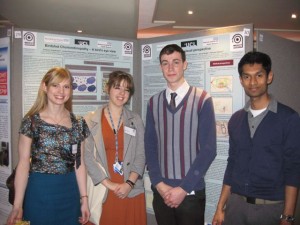Louise Ramskold, Rebecca Morris, Robert Wilkinson and Ruthiran Kugathasan, UCL medical students presented their posters about the Birdshot Day held in September 2010 to the AoME (Academy of Medical Educators) this Wednesday. Here they are pictured in front of their posters.
Titled: A Visual perspective, (right) and Birdshot Chorioretinopathy a Birdseye view (left), the posters set out what the students had learned from their involvement with the day.
Here are couple of quotes from two the students who were involved. As well as us patients learning a lot, it seems that the day has also helped to make our future doctors much more aware of a patients’ need.
“As a basis for medical education it taught us about a novel way of enhancing patient care, providing support for patients, their relatives and the professionals looking after them, decreasing medical errors by increasing awareness of the disease (and the potentially toxic drugs used to treat it) and optimising the strength of the relationship between the patient and health care professionals. Through this effort as medical students, we have not only learnt about the disease, but enhanced our communication, organisational and evaluation skills. We have discussed with patients and professionals the problems of caring for patients who have a chronic visually disabling disease (for which there is no cure) and understood the disease from the patients’ point of view.”
“The Birdshot Patient Day was not only a day in its isolation, but a whole project which has provided me with invaluable skills and memories. Being involved as a medical student in the organisation of the event from its very outset allowed me to see it grow from an animated vision to reality. In preparation of the day, we were given concrete tasks – such as generating means of evaluating the day and to investigate the, possibly differing, views of patients and health care professionals on various Birdshot related themes. With these tangible goals in mind, we set off learning about Birdshot, problems in treating and living with a rare and chronic disease, support structures available and the invaluable source of enthusiasm and knowledge from expert patients. I found it extremely inspirational to work so close with both patients and a whole range of health care professionals. The assignments gave obvious purpose to the work and as we attended seminars on Birdshot as well as interviewed patients, it quickly became clear how important mutual understanding and effective communication are in order to decrease needless medical errors and to improve the doctor-patient relationship. This innovative strategy of engaging medical students in patient days can be applied on a much broader scale and I personally feel that it should be something that more students have the opportunity to pursue – both for our own and future patients’ benefit.”
A Birdshot member said this just before Christmas about what we have done:
“If I ever come across someone with a rare disease without a support group, I’ll tell them to set one up along the lines of BUS!”
We are of course delighted to hear this !
